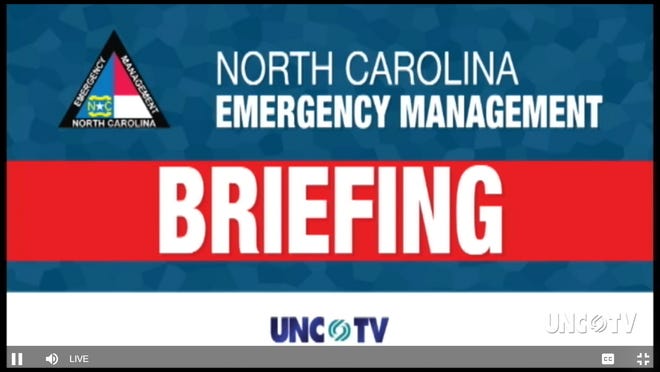NC's 1st case of 'community spread' coronavirus; Schools likely shut longer; Unemployment aid requests spike
 Joel Burgess
Joel Burgess
The Citizen Times is providing this story for free to readers because of the need for information about the coronavirus. We encourage you to further support local journalism by subscribing.
North Carolina has its first confirmed case of "community transmission" of the coronavirus, and the state will move into a new phase of combating the disease, Gov. Roy Cooper and other officials said in a March 19 meeting with media about how the pandemic was affecting the state.
Cooper also said a school closure likely will be extended and that officials were working to deal with a tremendous spike in applications for unemployment aid.
The statements came during a 1 p.m. press conference featuring medical, political, emergency and employment assistance officials. The conferences have become a daily event in the wake of the COVID-19 outbreak.
Coronavirus in NC:Buncombe orders certain businesses to close, bans gatherings of 10 or more
'Community transmission'
As of the night of March 19, the state had 97 cases of COVID-19, Cooper said, including the first case of a community spread infection. The case was confirmed in Wilson County, east of Raleigh. The community transmission means the person was infected in the local area and didn't travel to a place with a high number of cases, such as New York City.
"This is an expected but still unfortunate benchmark," the governor said.
Health and Human Services Secretary Dr. Mandy Cohen said that means the state will move into its second phase, known as the “mitigation phase," against the virus, though some of those measures have already been implemented, such as shutting restaurants and limiting gatherings. Now the state will look to end elective surgeries as some hospitals have already done, Cohen said. Mission Hospital has not. A shelter-in-place order could also be considered.
Tracking the coronavirus:An interactive map of active cases
Schools likely shut longer, unemployment aid claim spike
Schools may be shut for longer than the scheduled two weeks, Cooper said.
"The order was until March 30, but I think people know with community spread now coming and this crisis increasing, that we will likely be out of school for a longer period of time."
Talking about unemployment assistance, Cooper Employment Security Commission Assistant Secretary Lockhart Taylor said people had made claims in striking numbers after the shuttering of many businesses and a state move loosening claim regulations. In a day and a half 18,000 claims had been made they said. The system is set up for 3,000 claims a week. Taylor said 50 additional employees are being hired to help with the claims, and he expected the first payments to go out within two weeks. Cooper promised that the system would be adjusted and people would have a chance to file.
Coronavirus:Event cancellations, closures and postponements in and around Asheville, WNC
Other highlights of the March 19 briefing:
• The Small Business Administration has approved special disaster loans for N.C. businesses and nonprofits.
• Cooper talked about how disruptive and disconcerting the situation is as people have lost jobs, the ability to socialize, to go to church or even to hug someone. He said people won’t be forgotten but that the state needs them to take the situation and guidelines seriously. The governor compared it to times he stood in front of a “Carolina Blue” sky and had to urge people to take seriously warnings about a hurricane.
• Emergency Management Director Mike Sprayberry asked people, as he has before, not to "panic buy" or horde. Sprayberry said that hurts those who can’t purchase many groceries at one time. He has said the supply chain for grocery stores remains strong.
• Asked about precautions for factory workers, Cooper said state officials have been asking managers to allow people to work from home. They’ve also suggested staggering shifts or taking other measures to reduce potential contact between employees.
• People were asked not to call 911 for nonemergency reasons, which could overload the system. Instead those people should call 211 for questions about the pandemic, where to get food or other concerns, Sprayberry said.
• Cohen explained the state's decision to list pregnant women in the high-risk group when the Centers for Disease Control had not. The N.C. health director said state experts were relying on data showing pregnant women were more susceptible to influenza, a similar disease.
From the CDC:What you need to know about the coronavirus
• Officials said that because the situation is so stressful and disorienting, people should remember that mental health services are available. Assistance can be gotten by calling 211.
• Asked about an upcoming teleconference with other governors and President Donald Trump, Cooper said he would continue to emphasize the importance of federal help. He said that would include asking for waivers of state matches required by some federal funding.
• While the state is enforcing a rule against gatherings of 100 or more, the state guideline is actually 50 people. Trump is recommending no more than 10. Buncombe officials on March 19 passed a rule against gatherings of 10 or more, though exceptions were granted for medical, child care and other facilities deemed necessary.
• Asked about delaying payroll and sales tax payments to help businesses, Cooper said he’s been talking to legislative leaders about the issue and they agree “everything is on the table." But he said the state also needs money to carry out relief programs. The state has $3.8 billion in its trust fund right now, enough to get through three months, even with increased benefits being sought.
Joel Burgess has lived in WNC for more than 20 years, covering politics, government and other news. He's written award-winning stories on topics ranging from gerrymandering to police use of force.